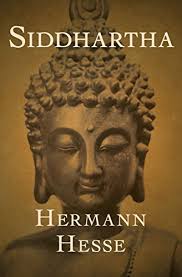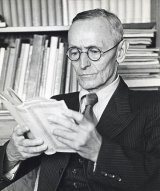Siddhartha Page #20
Siddhartha is a novel by Hermann Hesse that deals with the spiritual journey of self-discovery of a man named Siddhartha during the time of the Gautama Buddha. The book, Hesse's ninth novel, was written in German, in a simple, lyrical style.
"Things are going downhill with you!" he said to himself, and laughed about it, and as he was saying it, he happened to glance at the river, and he also saw the river going downhill, always moving on downhill, and singing and being happy through it all. He liked this well, kindly he smiled at the river. Was this not the river in which he had intended to drown himself, in past times, a hundred years ago, or had he dreamed this? Wondrous indeed was my life, so he thought, wondrous detours it has taken. As I boy, I had only to do with gods and offerings. As a youth, I had only to do with asceticism, with thinking and meditation, was searching for Brahman, worshipped the eternal in the Atman. But as a young man, I followed the penitents, lived in the forest, suffered of heat and frost, learned to hunger, taught my body to become dead. Wonderfully, soon afterwards, insight came towards me in the form of the great Buddha's teachings, I felt the knowledge of the oneness of the world circling in me like my own blood. But I also had to leave Buddha and the great knowledge. I went and learned the art of love with Kamala, learned trading with Kamaswami, piled up money, wasted money, learned to love my stomach, learned to please my senses. I had to spend many years losing my spirit, to unlearn thinking again, to forget the oneness. Isn't it just as if I had turned slowly and on a long detour from a man into a child, from a thinker into a childlike person? And yet, this path has been very good; and yet, the bird in my chest has not died. But what a path has this been! I had to pass through so much stupidity, through so much vices, through so many errors, through so much disgust and disappointments and woe, just to become a child again and to be able to start over. But it was right so, my heart says "Yes" to it, my eyes smile to it. I've had to experience despair, I've had to sink down to the most foolish one of all thoughts, to the thought of suicide, in order to be able to experience divine grace, to hear Om again, to be able to sleep properly and awake properly again. I had to become a fool, to find Atman in me again. I had to sin, to be able to live again. Where else might my path lead me to? It is foolish, this path, it moves in loops, perhaps it is going around in a circle. Let it go as it likes, I want to take it. Wonderfully, he felt joy rolling like waves in his chest. Wherever from, he asked his heart, where from did you get this happiness? Might it come from that long, good sleep, which has done me so good? Or from the word Om, which I said? Or from the fact that I have escaped, that I have completely fled, that I am finally free again and am standing like a child under the sky? Oh how good is it to have fled, to have become free! How clean and beautiful is the air here, how good to breathe! There, where I ran away from, there everything smelled of ointments, of spices, of wine, of excess, of sloth. How did I hate this world of the rich, of those who revel in fine food, of the gamblers! How did I hate myself for staying in this terrible world for so long! How did I hate myself, have deprive, poisoned, tortured myself, have made myself old and evil! No, never again I will, as I used to like doing so much, delude myself into thinking that Siddhartha was wise! But this one thing I have done well, this I like, this I must praise, that there is now an end to that hatred against myself, to that foolish and dreary life! I praise you, Siddhartha, after so many years of foolishness, you have once again had an idea, have done something, have heard the bird in your chest singing and have followed it! Thus he praised himself, found joy in himself, listened curiously to his stomach, which was rumbling with hunger. He had now, so he felt, in these recent times and days, completely tasted and spit out, devoured up to the point of desperation and death, a piece of suffering, a piece of misery. Like this, it was good. For much longer, he could have stayed with Kamaswami, made money, wasted money, filled his stomach, and let his soul die of thirst; for much longer he could have lived in this soft, well upholstered hell, if this had not happened: the moment of complete hopelessness and despair, that most extreme moment, when he hung over the rushing waters and was ready to destroy himself. That he had felt this despair, this deep disgust, and that he had not succumbed to it, that the bird, the joyful source and voice in him was still alive after all, this was why he felt joy, this was why he laughed, this was why his face was smiling brightly under his hair which had turned gray. "It is good," he thought, "to get a taste of everything for oneself, which one needs to know. That lust for the world and riches do not belong to the good things, I have already learned as a child. I have known it for a long time, but I have experienced only now. And now I know it, don't just know it in my memory, but in my eyes, in my heart, in my stomach. Good for me, to know this!" For a long time, he pondered his transformation, listened to the bird, as it sang for joy. Had not this bird died in him, had he not felt its death? No, something else from within him had died, something which already for a long time had yearned to die. Was it not this what he used to intend to kill in his ardent years as a penitent? Was this not his self, his small, frightened, and proud self, he had wrestled with for so many years, which had defeated him again and again, which was back again after every killing, prohibited joy, felt fear? Was it not this, which today had finally come to its death, here in the forest, by this lovely river? Was it not due to this death, that he was now like a child, so full of trust, so without fear, so full of joy? Now Siddhartha also got some idea of why he had fought this self in vain as a Brahman, as a penitent. Too much knowledge had held him back, too many holy verses, too many sacrificial rules, to much self-castigation, so much doing and striving for that goal! Full of arrogance, he had been, always the smartest, always working the most, always one step ahead of all others, always the knowing and spiritual one, always the priest or wise one. Into being a priest, into this arrogance, into this spirituality, his self had retreated, there it sat firmly and grew, while he thought he would kill it by fasting and penance. Now he saw it and saw that the secret voice had been right, that no teacher would ever have been able to bring about his salvation. Therefore, he had to go out into the world, lose himself to lust and power, to woman and money, had to become a merchant, a dice-gambler, a drinker, and a greedy person, until the priest and Samana in him was dead. Therefore, he had to continue bearing these ugly years, bearing the disgust, the teachings, the pointlessness of a dreary and wasted life up to the end, up to bitter despair, until Siddhartha the lustful, Siddhartha the greedy could also die. He had died, a new Siddhartha had woken up from the sleep. He would also grow old, he would also eventually have to die, mortal was Siddhartha, mortal was every physical form. But today he was young, was a child, the new Siddhartha, and was full of joy.
Translation
Translate and read this book in other languages:
Select another language:
- - Select -
- 简体中文 (Chinese - Simplified)
- 繁體中文 (Chinese - Traditional)
- Español (Spanish)
- Esperanto (Esperanto)
- 日本語 (Japanese)
- Português (Portuguese)
- Deutsch (German)
- العربية (Arabic)
- Français (French)
- Русский (Russian)
- ಕನ್ನಡ (Kannada)
- 한국어 (Korean)
- עברית (Hebrew)
- Gaeilge (Irish)
- Українська (Ukrainian)
- اردو (Urdu)
- Magyar (Hungarian)
- मानक हिन्दी (Hindi)
- Indonesia (Indonesian)
- Italiano (Italian)
- தமிழ் (Tamil)
- Türkçe (Turkish)
- తెలుగు (Telugu)
- ภาษาไทย (Thai)
- Tiếng Việt (Vietnamese)
- Čeština (Czech)
- Polski (Polish)
- Bahasa Indonesia (Indonesian)
- Românește (Romanian)
- Nederlands (Dutch)
- Ελληνικά (Greek)
- Latinum (Latin)
- Svenska (Swedish)
- Dansk (Danish)
- Suomi (Finnish)
- فارسی (Persian)
- ייִדיש (Yiddish)
- հայերեն (Armenian)
- Norsk (Norwegian)
- English (English)
Citation
Use the citation below to add this book to your bibliography:
Style:MLAChicagoAPA
"Siddhartha Books." Literature.com. STANDS4 LLC, 2024. Web. 24 Nov. 2024. <https://www.literature.com/book/siddhartha_24>.




Discuss this Siddhartha book with the community:
Report Comment
We're doing our best to make sure our content is useful, accurate and safe.
If by any chance you spot an inappropriate comment while navigating through our website please use this form to let us know, and we'll take care of it shortly.
Attachment
You need to be logged in to favorite.
Log In